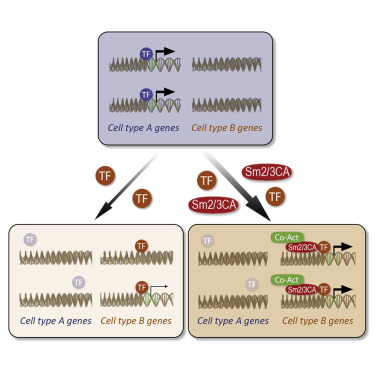当前位置:
X-MOL 学术
›
Cell Stem Cell
›
论文详情
Our official English website, www.x-mol.net, welcomes your
feedback! (Note: you will need to create a separate account there.)
Constitutively Active SMAD2/3 Are Broad-Scope Potentiators of Transcription-Factor-Mediated Cellular Reprogramming.
Cell Stem Cell ( IF 19.8 ) Pub Date : 2017-Dec-07 , DOI: 10.1016/j.stem.2017.10.013 Tyson Ruetz 1 , Ulrich Pfisterer 2 , Bruno Di Stefano 3 , James Ashmore 1 , Meryam Beniazza 1 , Tian V Tian 3 , Daniel F Kaemena 1 , Luca Tosti 1 , Wenfang Tan 1 , Jonathan R Manning 1 , Eleni Chantzoura 1 , Daniella Rylander Ottosson 2 , Samuel Collombet 4 , Anna Johnsson 5 , Erez Cohen 1 , Kosuke Yusa 6 , Sten Linnarsson 5 , Thomas Graf 7 , Malin Parmar 2 , Keisuke Kaji 1
Cell Stem Cell ( IF 19.8 ) Pub Date : 2017-Dec-07 , DOI: 10.1016/j.stem.2017.10.013 Tyson Ruetz 1 , Ulrich Pfisterer 2 , Bruno Di Stefano 3 , James Ashmore 1 , Meryam Beniazza 1 , Tian V Tian 3 , Daniel F Kaemena 1 , Luca Tosti 1 , Wenfang Tan 1 , Jonathan R Manning 1 , Eleni Chantzoura 1 , Daniella Rylander Ottosson 2 , Samuel Collombet 4 , Anna Johnsson 5 , Erez Cohen 1 , Kosuke Yusa 6 , Sten Linnarsson 5 , Thomas Graf 7 , Malin Parmar 2 , Keisuke Kaji 1
Affiliation

|
Reprogramming of cellular identity using exogenous expression of transcription factors (TFs) is a powerful and exciting tool for tissue engineering, disease modeling, and regenerative medicine. However, generation of desired cell types using this approach is often plagued by inefficiency, slow conversion, and an inability to produce mature functional cells. Here, we show that expression of constitutively active SMAD2/3 significantly improves the efficiency of induced pluripotent stem cell (iPSC) generation by the Yamanaka factors. Mechanistically, SMAD3 interacts with reprogramming factors and co-activators and co-occupies OCT4 target loci during reprogramming. Unexpectedly, active SMAD2/3 also markedly enhances three other TF-mediated direct reprogramming conversions, from B cells to macrophages, myoblasts to adipocytes, and human fibroblasts to neurons, highlighting broad and general roles for SMAD2/3 as cell-reprogramming potentiators. Our results suggest that co-expression of active SMAD2/3 could enhance multiple types of TF-based cell identity conversion and therefore be a powerful tool for cellular engineering.
更新日期:2017-11-22











































 京公网安备 11010802027423号
京公网安备 11010802027423号